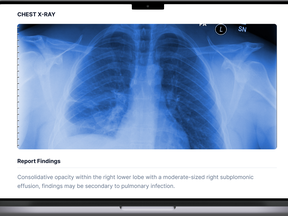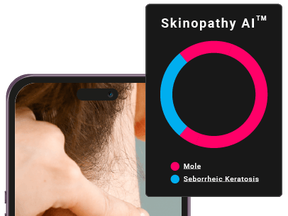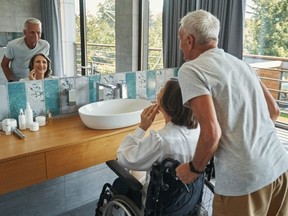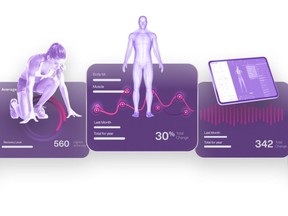Breadcrumb Links
Technology Basics
Free apps, AI advancements help Canucks live healthier lives
Published June 22, 2024 • 4 minute read
To save this article, register for free here, or sign in if you have an account.
 Telus Health's Precision Health is a preventive health platform that provides personalized information about your current and future health. Photo courtesy of TELUS Health Inc.
Telus Health's Precision Health is a preventive health platform that provides personalized information about your current and future health. Photo courtesy of TELUS Health Inc.
Article Contents
While we don't often brag about ourselves in Canada, our country is home to a multitude of healthcare companies, big and small, that provide smart solutions to help us live healthier lives.
Ad 2
This advertisement has not loaded yet, but article continues below.
This content is available to subscribers only
Subscribe now to read the latest news from your city and across Canada.
With one account, you'll enjoy unlimited online access to articles from across Canada. Exclusive access to the Toronto Sun ePaper, an electronic replica of the print edition that you can share, download and comment on. Enjoy insights and behind-the-scenes analysis from award-winning journalists. Support local journalists and the next generation of journalists. Daily puzzles, including the New York Times Crossword.
Subscribe to unlock more articles
Subscribe now to read the latest news from your city and across Canada.
With one account, you'll enjoy unlimited online access to articles from across Canada. Exclusive access to the Toronto Sun ePaper, an electronic replica of the print edition that you can share, download and comment on. Enjoy insights and behind-the-scenes analysis from award-winning journalists. Support local journalists and the next generation of journalists. Daily puzzles, including the New York Times Crossword.
Register/Sign in to view more articles
To continue reading, please create an account or sign in.
Access articles from across Canada with one account. Share your thoughts in the comments and join the conversation. Enjoy additional articles every month. Receive email updates from your favourite authors.
Don't have an account? Create an account
or
Sign in without a password New feature, new way to log in
Article Contents
With the help of technology, including AI, we can easily access (and understand) medical scans, digitally monitor elderly loved ones living alone at home, detect skin cancer using our smartphone cameras, and access reliable medical videos rather than Google searching our symptoms on random sites and panicking over a misdiagnosis.
After all, North America is fortunate to have a universal health care system, but the system has some gaps that can be filled with the help of technology.
Here are some homemade solutions worth checking out:
 Toronto-based PocketHealth, whose basic version is free, makes it easy to access and share medical images through its secure website. Photo credit: Pocket Health Inc.
Toronto-based PocketHealth, whose basic version is free, makes it easy to access and share medical images through its secure website. Photo credit: Pocket Health Inc.
Pocket Health
Do you need an MRI, ultrasound, CT scan or x-ray?
It may seem old-fashioned, but some Canadian hospitals and clinics still give patients CD-ROMs with medical images. Even in 2024. Patients likely don't have a medium to view this, so they may need to give the scans directly to their doctor. Toronto-based PocketHealth, whose basic version is free, makes it easy to access and share medical images through a secure website that can be viewed on smartphones, tablets, laptops and desktops. Patients receive a permanent digital copy of their full diagnostic-quality imaging record, which they can email (and print if they like) to any medical professional on the planet.
Your midday sun
Thank you for your registration!
Article Contents
Ad 3
This advertisement has not loaded yet, but article continues below.
Article Contents
Through paid plans, patients can opt into additional features such as personalized insights and deciphering medical terminology.
 Skinopathy uses your smartphone camera to proactively screen your skin for potential cancers. Photo courtesy of Skinopathy Inc.
Skinopathy uses your smartphone camera to proactively screen your skin for potential cancers. Photo courtesy of Skinopathy Inc.
Skin disorders
Skinopathy's free GetSkinHelp app uses your smartphone camera to proactively screen your skin for possible cancer. Simply take a photo of a suspicious mole or other skin condition that concerns you, and you'll be presented with an initial AI analysis, after which you'll be prompted to book an appointment with a medical professional who can provide a formal diagnosis and next steps.
Speaking at the Collision conference in Toronto last week, Keith Lu, CEO of York Region-based Skinopathy, headquartered just north of Toronto, explained that AI also works accurately on people with darker skin that may be harder to spot with the naked eye, meaning potentially dangerous conditions may not be diagnosed until later stages.
Ad 4
This advertisement has not loaded yet, but article continues below.
Article Contents
Editor's recommendation

Saltzman: The latest pet technology for our furry friends is FurReal

Saltzman: For dads and grads, these new gadgets make great gifts
Acoustics
According to Oncostyx CEO Beth Rogozinski, more than 2 billion people worldwide have (or are at risk for) liver disease, but most people are unaware they have it because most are asymptomatic until the disease has progressed.
The Toronto-based company uses AI software to detect liver disease through ultrasound scans, which technicians can perform within minutes using relatively inexpensive equipment to distinguish between healthy and diseased tissue.
This alternative biopsy, which is pending FDA approval, could potentially be used on other organs, including the kidneys, and could potentially detect prostate, breast and thyroid diseases and cancers.
Ad 5
This advertisement has not loaded yet, but article continues below.
Article Contents
YouTube Health
Startups aren't the only ones doing interesting things in the healthcare space: Google-owned YouTube is trying to combat misinformation by expanding its YouTube Health initiative, which launched in 2022.
The wildly popular platform shares vetted health-related videos from trusted organizations, including Canadian institutions like the Toronto Children's Hospital and the Centre for Addiction and Mental Health (CAMH), and now also includes individual certified doctors, nurses, and mental health professionals.
Knowledge is power.
Recommended Videos
Sorry, this video has failed to load.
Play video
Precision Health by Telus Health
A new service launching in Calgary, Precision Health from Telus Health, is a preventive health platform that provides personalized information about your current and future health conditions.
Ad 6
This advertisement has not loaded yet, but article continues below.
Article Contents
Using advanced data analysis gathered through full-body imaging, genomics and bioanalytical insights (proteins, hormones, metabolic markers, nutritional needs etc.), the aim is to look at your health holistically, taking into account genetic, environmental and lifestyle factors to create highly customized strategies to maintain your health and proactively address future risks.
Interestingly, Precision Health may include 3D digital replicas of your body, organs, muscles and tissues to aid in the process, creating a “digital twin” – a virtual replica of yourself.
Prices for the package start at $2,695.
 CareAware uses “Wi-Fi sensing” to track the movements of elderly loved ones in their homes. Photo courtesy of Cognitive Systems
CareAware uses “Wi-Fi sensing” to track the movements of elderly loved ones in their homes. Photo courtesy of Cognitive Systems
CareAware
It sounds like science fiction, but Waterloo-based Cognitive Systems distributes CareAware, which uses “Wi-Fi sensing” to track the movements of elderly loved ones around the home, providing peace of mind to far-flung caregivers, such as sons or granddaughters.
Ad 7
This advertisement has not loaded yet, but article continues below.
Article Contents
This means that non-intrusive wireless signals (not cameras) can let you know where your elderly relatives are in the home and when, providing valuable real-time insights on the app.
For example, it can tell you if an elderly relative has been wandering around the house throughout the night or has been going to the bathroom frequently. Or it can let you know if there is no activity in the house at all, or if sensors in the kitchen haven't worked for six or seven hours (suggesting that the person with dementia hasn't eaten or taken their medication in that time).
In partnership with US-based Electronic Caregiver, the CareAware platform includes four user-friendly smart plugs that connect to your Wi-Fi network.
Araya Care
Another “aging in place” solution comes from Montreal-based AlayaCare, which is creating efficiencies for home care providers so people can age in their own home with dignity.
The company is using AWS to experiment with predictive models to determine which patients are at highest risk and then incorporates that data into provider workflow processes, making them more efficient.
AlayaCare is offering a free one-hour video webinar with three healthcare experts on AI in home care, highlighting four use cases on how AI and machine learning can drive better outcomes, including early detection of risk for your loved ones.
Article Contents
Share this article on social networks



